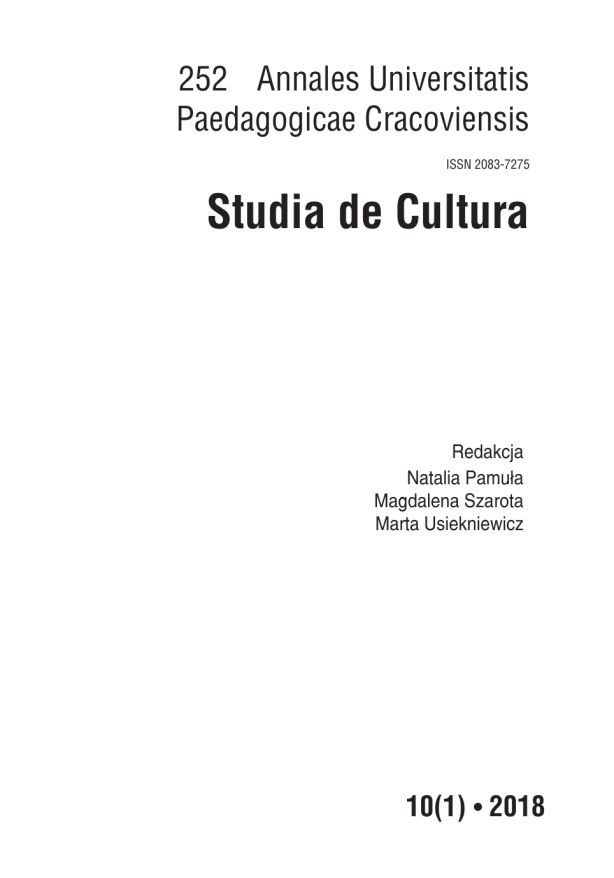Abstrakt
10.24917/20837275.10.1.6
W tekście przybliżam wybrane zagadnienia i problemy wyłaniające się przy próbie analizy pop/kulturowego dyskursu o seksualności osób niepełnosprawnych. W tym celu posługuję się szeregiem narzędzi metodologiczno-teoretycznych, takich jak: kulturowy model niepełnosprawności, analiza kulturowa, teoria krytyczna (critical theory) elementy etnografii i crip theory.
An introduction to cultural representations of disabled people’s sexuality
In the following article, I outline some of the issues and problems that one may encounter while attempting to analyse the pop/cultural representations of disabled people’s sexuality. Towards this end, I employ a variety of methodological and theoretical tools, such as e.g. cultural model of disability/cultural analysis, critical theory, elements of ethnographical research and crip theory.
Bibliografia
Aktualności filmowe+. 2013. [program telewizyjny, 2.10.]. Canal+ film.
Zobacz w Google Scholar
Barnes C., Oliver, M. 2006. “Disability Politics: Where did it all go wrong?”. http://disability-studies.leeds.ac.uk/library/author/barnes.colin (dostęp: 12.04.2017).
Zobacz w Google Scholar
Bose S. 2014. “Margarita with a straw” [film]. Wolfe Releasing. https://www.netflix.com/watch/80018695?trackId=13752289&tctx=0%2C0%2C694336a5-c970-4c4e-828b-57f57f9ea7ca-3587353 (dostęp: 1.07.2017).
Zobacz w Google Scholar
Braidotti R. 2014. Po człowieku. Warszawa.
Zobacz w Google Scholar
Brewer J.D. 2003. Ethnography. W The A-Z of Social Research. R.L. Miller, J.D. Brewer (red.). London. 100–103.
Zobacz w Google Scholar
Bronner S.E. 2011. Critical Theory: A Very Short Introduction. New York.
Zobacz w Google Scholar
Burnet R. 2016. “Fundamentals of caring” [film]. Netflix. https://www.netflix.com/watch/ 80097349?trackId=13752289&tctx=0%2C0%2C1a1cd5baef2e0de4197eaed48207b-4b76ad64731%3A53b626c58c5a94ab692ed0e472a7a78271205d20 (dostęp: 2.07.2017).
Zobacz w Google Scholar
Clough G., Ferguson R. 2009. “Top 40 Potential Viva Questions”. http://www.open.ac.uk/blo-gs/ResearchEssentials/?p=156 (dostęp: 18.05.2017).
Zobacz w Google Scholar
Crow L. 1996. Including all of our lives: renewing the social model of disability. W Encounters with strangers: Feminism and Disability. J. Morris (red.). London. 206–226).
Zobacz w Google Scholar
Flemming I. 1958. Dr No. London.
Zobacz w Google Scholar
Goddard R., Payne M. 2013. “Criticality and the practice-based MA: an argument drawn from teaching on the Masters in Teaching and Learning (MTL)”. International Research and Pedagogy nr 39(1). 123–135. https://doi.org/10.1080/02607476.2012.733195 (dostęp: 18.05.2017).
Zobacz w Google Scholar
Goodley D. 2013. “Dis/entangling critical disability studies”. Disability & Society nr 28(5). 631–644. https://doi.org/10.1080/09687599.2012.717884 (dostęp: 18.05.2017).
Zobacz w Google Scholar
Goodley D. 2014. Dis/ability Studies: Theorising disablism and ableism. London.
Zobacz w Google Scholar
Goodley D. 2016. Disability Studies: An Interdisciplinary Introduction. London.
Zobacz w Google Scholar
Goodley D., Lawthom R. (red.). 2006. Disability and psychology: critical introductions and reflections. Basingstoke.
Zobacz w Google Scholar
Goodley D., Lawthom R., Runswick-Cole K. 2014. “Posthuman disability studies”. Subjectivity nr 7(4). 342–361.
Zobacz w Google Scholar
Goodley D., Mackiewicz M. (b.d.). Critical disability studies: sketches from the UK and Poland. [niepublikowany manuskrypt].
Zobacz w Google Scholar
Higgins K. 2015. “Dear Able Friends, I Am Not Your Inspiration Porn”. http://www.huffingtonpost.com/karrie-higgins/not-your-inspiration-porn_b_8172842.html (dostęp: 15.10. 2015).
Zobacz w Google Scholar
Izdebski Z. 2014. O potrzebie całożyciowej edukacji seksualnej. Zaprezentowano na „Oblicza seksualności osób niepełnosprawnych – wątki rozproszone w pedagogice specjalnej” – październik. Kraków.
Zobacz w Google Scholar
Lewin B. 2012. The sessions. [film] Fox.
Zobacz w Google Scholar
Lewis V.A. 2015. Crip. W Keywords for disability studies. R. Adams, B. Reiss, D. Serlin (red.). New York. 46–48.
Zobacz w Google Scholar
Mackiewicz M. 2013. Disability as odd: a quasi-autobiographical cultural analysis [niepublikowana praca magisterska]. University of Sheffield.
Zobacz w Google Scholar
Martinez F. 2014. What the **** is normal?! London.
Zobacz w Google Scholar
McRuer R. 2003. “As Good As It Gets: Queer Theory and Critical Disability”. GLQ: A Journal of Lesbian and Gay Studies nr 9(1). 79–105.
Zobacz w Google Scholar
McRuer R. 2006. Crip theory: Cultural signs of queerness and disability. New York.
Zobacz w Google Scholar
Mitchell D.T., Snyder, S.L. 2000. Narrative prosthesis: Disability and the dependencies of discourse. Ann Arbor, University of Michigan.
Zobacz w Google Scholar
Morris J. (red.). 1989. Able lives: Women’s experience of paralysis. London.
Zobacz w Google Scholar
Morris J. (red.). 1996. Encounters with strangers: Feminism and Disability. London.
Zobacz w Google Scholar
Nie-pelnosprawni.pl. 2013. „Seksterapeutki w Polsce? «Rozpętałaby się religijno-polityczna burza»”. http://www.nie-pelnosprawni.pl/index.php/ludzie-i-wydarzenia/sex-niepenosprawnych/3818-seksterapeutki-w-polsce-rozpetalaby-sie-religijno-polityczna-burza?jsn_mobilize_preview=1?jsn_mobilize_preview=1 (dostęp: 15.05.2017).
Zobacz w Google Scholar
O’Brien M. 1990. “On Seeing A Sex Surrogate”. The Sun Magazine nr 174. 1–7.
Zobacz w Google Scholar
Oliver M. 1990. The politics of disablement. London.
Zobacz w Google Scholar
Oliver M. 1996. Understanding disability: from theory to practice. Basingstoke.
Zobacz w Google Scholar
Overboe J. 2007. “Disability and Genetics: Affirming the Bare Life (the State of Exception)”. The Canadian Review of Sociology and Anthropology nr 44(2). 219–235.
Zobacz w Google Scholar
Perry D.M. 2015. “Inspiration porn further disables the disabled”. http://america.aljazeera.com/opinions/2015/6/inspiration-porn-further-disables-the-disabled.html (dostęp: 15.10.2015).
Zobacz w Google Scholar
Pieprzyca M. 2013. Chce się żyć. [film] Kino Świat.
Zobacz w Google Scholar
Porter S. 2003. Critical theory. W The A-Z of Social Research. R.L. Miller, J.D. Brewer (red.). London. 58–61.
Zobacz w Google Scholar
Rozmowy w Toku. 2013. Czy kobieta na wózku może być pociągająca? [program telewizyjny] TVN.
Zobacz w Google Scholar
Runswick-Cole K. 2011. Ethnography. W P. Banister, G. Bunn, E. Burman i in., Qualitative methods in psychology: a research guide. Maidenhead. 75–87.
Zobacz w Google Scholar
Samuels E. 2015. Passing. W Keywords for disability studies. R. Adams, B. Reiss, D. Serlin (red.). New York. 135–137.
Zobacz w Google Scholar
Skalski R. 2010. Kochankowie [dokument telewizyjny]. Krakowska Fundacja Filmowa.
Zobacz w Google Scholar
Snyder S.L., Mitchell D.T. 2006. Cultural locations of disability. Chicago.
Zobacz w Google Scholar
Swain J., French S., Barnes C., Thomas, C. (red.). 2014. Disabling Barriers – Enabling Environments. London.
Zobacz w Google Scholar
Szostkiewicz A. 2013. „Czyje jest ciało?”. Polityka nr 40. 12–14.
Zobacz w Google Scholar
Thomas C. 2007. Sociologies of disability and illness: contested ideas in disability studies and medical sociology. Basingstoke.
Zobacz w Google Scholar
Tok FM. 2013. „Seksterapeutki w Polsce? «Rozpętałaby się religijno-polityczna burza»”. http://www.tokfm.pl/Tokfm/1,102433,13274409,Seksterapeutki_w_Polsce___Rozpeta-laby_sie_religijno_polityczna.html (dostęp: 11.07.2014).
Zobacz w Google Scholar
Young S. 2014. “I’m not your inspiration, thank you very much”. https://www.youtube.com/watch?v=8K9Gg164Bsw (dostęp: 2.06.2017).
Zobacz w Google Scholar

